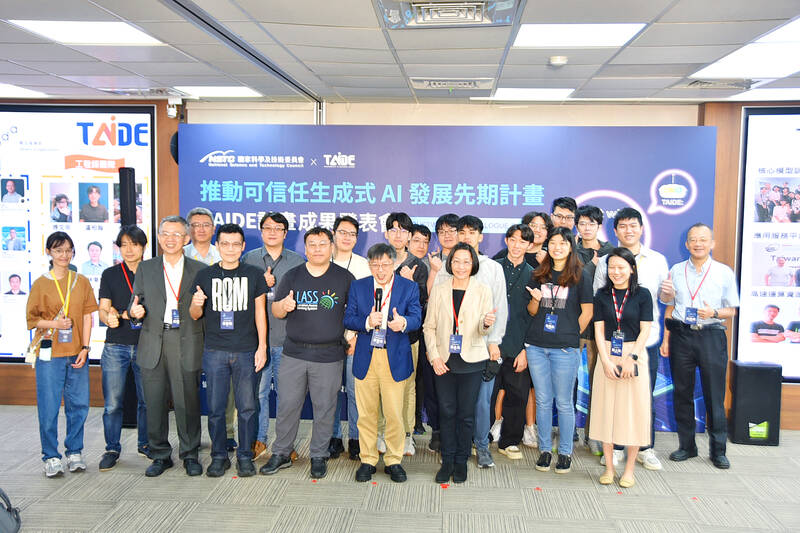A presentation yesterday on Taiwan’s self-built language model TAIDE, released commercially on April 15, showed the many fields it can be applied to, from language learning and agricultural knowledge searches to banking customer service.
The project to develop TAIDE, which stands for Trustworthy AI Dialogue Engine, was initiated by the National Science and Technology Council (NSTC) in April last year to create a foundational model for a traditional Chinese generative AI dialogue engine specifically for Taiwan.
The NSTC has collaborated with several institutions on the project over the past year, and a number of them appeared at yesterday’s presentation in Taipei to promote the system and demonstrate some of its applications.

Photo: Wu Po-hsuan, Taipei Times
For example, a team from the University of Tainan, led by computer science and information engineering professor Lee Chang-shing (李建興), developed a Taiwanese Hokkien-English AI chatbot for elementary and junior-high students based on TAIDE to learn the languages.
National Chung Hsing University has created an agricultural knowledge search engine called “Divine Farmer TAIDE” that can answer professional agricultural questions with citations, said Fan Yao-chung (范耀中), an associate professor of computer science and engineering at the university.
He said the answers generated through “Divine Farmer TAIDE” are more “context-based and detailed” than an engine the team previously developed based on ChatGPT because the new model includes reports from the Ministry of Agriculture in its database.
Taiwan Business Bank, in collaboration with an AI company, has applied TAIDE to help the bank’s employees access internal financial product information — which can be complicated and is continuously being updated — to help them provide better customer service.
The TAIDE model is “grounded in Taiwanese culture, incorporating unique elements such as Taiwanese language, values, and customs, enabling generative AI to understand and respond to the needs of local users,” the council said.
A TAIDE model based on Meta’s Llama 2 (Large Language Model Meta AI) model (TAIDE-LX-7B) was released for commercial use on April 15, and another version for research only (TAIDE-LX-13B) has also been released.
NSTC minister Wu Tsung-tsong (吳政忠) said the TAIDE LX-7B has been downloaded more than 6,000 times in the half month since it was released, showing that there is demand for a traditional Chinese-based foundational model with a contextual understanding of Taiwan.
Announcing that the project would be extended for another year, Wu compared TAIDE to a car engine, adding that it would be up to different fields to use the model to “make their own cars.”
However, Lee Yuh-jye (李育杰), a research fellow at the Research Center for Information Technology Innovation and a TAIDE project convener, said that TAIDE is not aimed at competing with other major engines.
Llama 3 is trained by 24,000 Nvidia’s H100 GPU (graphics processing unit, which has become the backbone of artificial training training), while Mixtral, another large language model, has 1,500, and “we only have 72.”
“What we have to do is to play smart,” not big, Lee said.

Chinese Nationalist Party (KMT) Chairman Eric Chu (朱立倫), spokeswoman Yang Chih-yu (楊智伃) and Legislator Hsieh Lung-chieh (謝龍介) would be summoned by police for questioning for leading an illegal assembly on Thursday evening last week, Minister of the Interior Liu Shyh-fang (劉世芳) said today. The three KMT officials led an assembly outside the Taipei City Prosecutors’ Office, a restricted area where public assembly is not allowed, protesting the questioning of several KMT staff and searches of KMT headquarters and offices in a recall petition forgery case. Chu, Yang and Hsieh are all suspected of contravening the Assembly and Parade Act (集會遊行法) by holding

PRAISE: Japanese visitor Takashi Kubota said the Taiwanese temple architecture images showcased in the AI Art Gallery were the most impressive displays he saw Taiwan does not have an official pavilion at the World Expo in Osaka, Japan, because of its diplomatic predicament, but the government-backed Tech World pavilion is drawing interest with its unique recreations of works by Taiwanese artists. The pavilion features an artificial intelligence (AI)-based art gallery showcasing works of famous Taiwanese artists from the Japanese colonial period using innovative technologies. Among its main simulated displays are Eastern gouache paintings by Chen Chin (陳進), Lin Yu-shan (林玉山) and Kuo Hsueh-hu (郭雪湖), who were the three young Taiwanese painters selected for the East Asian Painting exhibition in 1927. Gouache is a water-based

Taiwan would welcome the return of Honduras as a diplomatic ally if its next president decides to make such a move, Minister of Foreign Affairs Lin Chia-lung (林佳龍) said yesterday. “Of course, we would welcome Honduras if they want to restore diplomatic ties with Taiwan after their elections,” Lin said at a meeting of the legislature’s Foreign Affairs and National Defense Committee, when asked to comment on statements made by two of the three Honduran presidential candidates during the presidential campaign in the Central American country. Taiwan is paying close attention to the region as a whole in the wake of a

OFF-TARGET: More than 30,000 participants were expected to take part in the Games next month, but only 6,550 foreign and 19,400 Taiwanese athletes have registered Taipei city councilors yesterday blasted the organizers of next month’s World Masters Games over sudden timetable and venue changes, which they said have caused thousands of participants to back out of the international sporting event, among other organizational issues. They also cited visa delays and political interference by China as reasons many foreign athletes are requesting refunds for the event, to be held from May 17 to 30. Jointly organized by the Taipei and New Taipei City governments, the games have been rocked by numerous controversies since preparations began in 2020. Taipei City Councilor Lin Yen-feng (林延鳳) said yesterday that new measures by